Category Archive 'Poetry'
31 Oct 2024

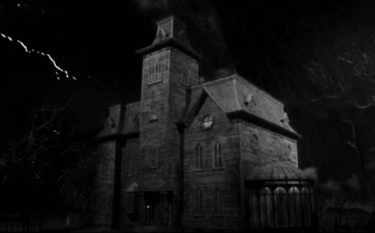
Midnight has come and the great Christ Church bell
And many a lesser bell sound through the room;
And it is All Souls’ Night.
And two long glasses brimmed with muscatel
Bubble upon the table. A ghost may come;
For it is a ghost’s right,
His element is so fine
Being sharpened by his death,
To drink from the wine-breath
While our gross palates drink from the whole wine.
I need some mind that, if the cannon sound
From every quarter of the world, can stay
Wound in mind’s pondering,
As mummies in the mummy-cloth are wound;
Because I have a marvellous thing to say,
A certain marvellous thing
None but the living mock,
Though not for sober ear;
It may be all that hear
Should laugh and weep an hour upon the clock.
Horton’s the first I call. He loved strange thought
And knew that sweet extremity of pride
That’s called platonic love,
And that to such a pitch of passion wrought
Nothing could bring him, when his lady died,
Anodyne for his love.
Words were but wasted breath;
One dear hope had he:
The inclemency
Of that or the next winter would be death.
Two thoughts were so mixed up I could not tell
Whether of her or God he thought the most,
But think that his mind’s eye,
When upward turned, on one sole image fell;
And that a slight companionable ghost,
Wild with divinity,
Had so lit up the whole
Immense miraculous house
The Bible promised us,
It seemed a gold-fish swimming in a bowl.
On Florence Emery I call the next,
Who finding the first wrinkles on a face
Admired and beautiful,
And by foreknowledge of the future vexed;
Diminished beauty, multiplied commonplace;
Preferred to teach a school
Away from neighbour or friend,
Among dark skins, and there
Permit foul years to wear
Hidden from eyesight to the unnoticed end.
Before that end much had she ravelled out
From a discourse in figurative speech
By some learned Indian
On the soul’s journey. How it is whirled about
Wherever the orbit of the moon can reach,
Until it plunge into the sun;
And there, free and yet fast,
Being both Chance and Choice,
Forget its broken toys
And sink into its own delight at last.
I call MacGregor Mathers from his grave,
For in my first hard spring-time we were friends,
Although of late estranged.
I thought him half a lunatic, half knave,
And told him so, but friendship never ends;
And what if mind seem changed,
And it seem changed with the mind,
When thoughts rise up unbid
On generous things that he did
And I grow half contented to be blind!
He had much industry at setting out,
Much boisterous courage, before loneliness
Had driven him crazed;
For meditations upon unknown thought
Make human intercourse grow less and less;
They are neither paid nor praised.
But he’d object to the host,
The glass because my glass;
A ghost-lover he was
And may have grown more arrogant being a ghost.
But names are nothing. What matter who it be,
So that his elements have grown so fine
The fume of muscatel
Can give his sharpened palate ecstasy
No living man can drink from the whole wine.
I have mummy truths to tell
Whereat the living mock,
Though not for sober ear,
For maybe all that hear
Should laugh and weep an hour upon the clock.
Such thought—such thought have I that hold it tight
Till meditation master all its parts,
Nothing can stay my glance
Until that glance run in the world’s despite
To where the damned have howled away their hearts,
And where the blessed dance;
Such thought, that in it bound
I need no other thing,
Wound in mind’s wandering
As mummies in the mummy-cloth are wound.
— William Butler Yeats, “All Souls’ Night” from Seven Poems and a Fragment. Dundrum: The Cuala Press, 1922.
05 Apr 2024

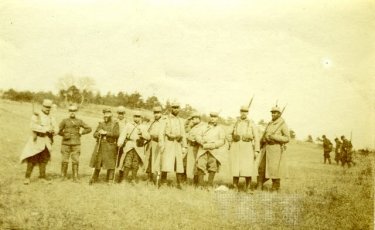
Henri Gaudier-Brzeska (1891-1915) standing in the midst of fellow soldiers 1915.
I wanted to quote the Ezra Pound poem, and then I found a particularly splendid framing for the poem by Wen Stephenson in the January 2005 issue of the Atlantic, so fine that I feel obliged to include it, as well.
“E has sent me the Chinese poems,” wrote a young French-born sculptor named Henri Gaudier-Brzeska, who was serving as an officer on the Western Front, to his London patron Olivia Shakespear on April 11, 1915. “I keep the book in my pocket, indeed I use them to put courage in my fellows. I speak now of the ‘Bowmen’ and the ‘North Gate,’ which are so appropriate to our case.”
[S]omething triggered a memory of Gaudier-Brzeska at the front and the little book he kept in his pocket.
That book, Cathay, published in London in April 1915, was a curious pamphlet containing eleven “Chinese” poems by Ezra Pound. It came in a drab tan wrapper—a reference, perhaps, to the uniforms then being worn, and shredded, in Belgium and France.
At the front of the volume appeared this puzzling inscription:
For the most part from the Chinese of Rihaku, from the notes of the late Ernest Fenollosa, and the decipherings of the professors Mori and Ariga.
Some explanation, some deciphering, is required. Rihaku is the Japanese form of Li Po, the great T’ang Dynasty poet who lived from 701 to 762. Ernest Fenollosa (1853-1908) was an American scholar of Far Eastern literature whose voluminous notes on classical Chinese poetry—compiled in Tokyo in 1896-99 and containing the Chinese characters accompanied by rough English translations of the poems—had been entrusted to Pound by Fenollosa’s widow in 1912. The professors Mori and Ariga were the Japanese scholars who served as Fenollosa’s translators and interpreters of the Chinese texts. Fenollosa, you see, couldn’t read Chinese. Neither could Pound.
There is much more to be said, about the text of Cathay itself and about Pound’s theory of “Imagisme” and his understanding, erroneous as it may have been, of the Chinese written character or “ideogram.” (For further decipherings, Richard Sieburth’s notes on Cathay in the Library of America’s recently published Ezra Pound: Poems and Translations are highly recommended, as is the chapter entitled “The Invention of China” in Hugh Kenner’s 1971 study The Pound Era.) T. S. Eliot famously called Pound “the inventor of Chinese poetry for our time.” But what Pound invented here had little to do with Chinese and everything to do with his time, our time—maybe all times.
So it was that somewhere in the trenches near the Marne in the early spring of 1915, the twenty-three-year-old Henri Gaudier -Brzeska read to his troops the following poem from Cathay, the one referred to in his letter as the “North Gate.” It’s a text, it has to be said, that is not so much translated—Pound’s Chinese “translations” are notoriously inaccurate, though accuracy as such was hardly the point—as derived, paraphrased, transmuted from the eighth-century source (by way of professors Fenollosa, Mori, and Ariga) into a new and startlingly powerful, startlingly alive, English poem.
To Gaudier-Brzeska in the trenches—despite the layers of history, geography, and language, of cultural and aesthetic mediation, separating him from the original Chinese—the poem, by some uncanny process, rang as true, as immediate, as any news bulletin. If literature is “news that stays news,” as Pound would later write, then here is a war poem appropriate to the ages.
Lament of the Frontier Guard
By the North Gate, the wind blows full of sand,
Lonely from the beginning of time until now!
Trees fall, the grass goes yellow with autumn.
I climb the towers and towers
to watch out the barbarous land:
Desolate castle, the sky, the wide desert.
There is no wall left to this village.
Bones white with a thousand frosts,
High heaps, covered with trees and grass;
Who brought this to pass?
Who has brought the flaming imperial anger?
Who has brought the army with drums and with kettle-drums?
Barbarous kings.
A gracious spring, turned to blood-ravenous autumn,
A turmoil of wars-men, spread over the middle kingdom,
Three hundred and sixty thousand,
And sorrow, sorrow like rain.
Sorrow to go, and sorrow, sorrow returning,
Desolate, desolate fields,
And no children of warfare upon them,
No longer the men for offence and defence.
Ah, how shall you know the dreary sorrow at the North Gate,
With Rihoku’s* name forgotten,
And we guardsmen fed to the tigers.
By Rihaku
[*Rihoku, not to be confused with Rihaku [Li Po], is the Japanese for Li Mu, a Chinese general who defended China against the Tartars and died in 223 B.C.E. (Richard Sieburth, Ezra Pound: Poems and Translations, Library of America, 2003).]
In his last letter to Mrs. Shakespear, on May 29, Gaudier-Brzeska wrote: “Today is magnificent, a fresh wind, clear sun and larks singing cheerfully. The shells do not disturb the songsters…. They solemnly proclaim man’s foolery and sacrilege of nature. I respect their disdain….”
He would be killed on June 5, 1915, in a charge at Neuville St. Vaast.
—————————–
Li Po aka Li Bai Wikipedia entry.
27 Mar 2024


The death of Roland at the Battle of Roncevaux (manuscript illustration c. 1455–1460. Bataille de Roncevaux en 778. Mort de Roland Grandes Chroniques de France, enluminées par Jean Fouquet, Tours, vers 1455-1460 Paris, BnF, département des Manuscrits, Français 6465, fol. 113 (Cinquième Livre de Charlemagne).
Przesłanie Pana Cogito
Idź dokąd poszli tamci do ciemnego kresu
po złote runo nicości twoją ostatnią nagrodę
idź wyprostowany wśród tych co na kolanach
wśród odwróconych plecami i obalonych w proch
ocalałeś nie po to aby żyć
masz mało czasu trzeba dać świadectwo
bądź odważny gdy rozum zawodzi bądź odważny
w ostatecznym rachunku jedynie to się liczy
a Gniew twój bezsilny niech będzie jak morze
ilekroć usłyszysz głos poniżonych i bitych
niech nie opuszcza ciebie twoja siostra Pogarda
dla szpiclów katów tchórzy – oni wygrają
pójdą na twój pogrzeb i z ulgą rzucą grudę
a kornik napisze twój uładzony życiorys
i nie przebaczaj zaiste nie w twojej mocy
przebaczać w imieniu tych których zdradzono o świcie
strzeż się jednak dumy niepotrzebnej
oglądaj w lustrze swą błazeńską twarz
powtarzaj: zostałem powołany – czyż nie było lepszych
strzeż się oschłości serca kochaj źródło zaranne
ptaka o nieznanym imieniu dąb zimowy
światło na murze splendor nieba
one nie potrzebują twego ciepłego oddechu
są po to aby mówić: nikt cię nie pocieszy
czuwaj – kiedy światło na górach daje znak – wstań i idź
dopóki krew obraca w piersi twoją ciemną gwiazdę
powtarzaj stare zaklęcia ludzkości bajki i legendy
bo tak zdobędziesz dobro którego nie zdobędziesz
powtarzaj wielkie słowa powtarzaj je z uporem
jak ci co szli przez pustynię i ginęli w piasku
a nagrodzą cię za to tym co mają pod ręką
chłostą śmiechu zabójstwem na śmietniku
idź bo tylko tak będziesz przyjęty do grona zimnych czaszek
do grona twoich przodków: Gilgamesza Hektora Rolanda
obrońców królestwa bez kresu i miasta popiołów
Bądź wierny Idź
————————————————————–
Zbigniew Herbert – The Message of Mr Cogito (English translation by Czeslaw Milosz)
Go where those others went to the dark boundary
for the golden fleece of nothingness your last prize
go upright among those who are on their knees
among those with their backs turned and those toppled in the dust
you were saved not in order to live
you have little time you must give testimony
be courageous when the mind deceives you be courageous
in the final account only this is important
and let your helpless Anger be like the sea
whenever you hear the voice of the insulted and beaten
let your sister Scorn not leave you
for the informers executioners cowards – they will win
they will go to your funeral with relief will throw a lump of earth
the woodborer will write your smoothed-over biography
and do not forgive truly it is not in your power
to forgive in the name of those betrayed at dawn
beware however of unnecessary pride
keep looking at your clown’s face in the mirror
repeat: I was called – weren’t there better ones than I
beware of dryness of heart love the morning spring
the bird with an unknown name the winter oak
light on a wall the splendour of the sky
they don’t need your warm breath
they are there to say: no one will console you
be vigilant – when the light on the mountains gives the sign- arise and go
as long as blood turns in the breast your dark star
repeat old incantations of humanity fables and legends
because this is how you will attain the good you will not attain
repeat great words repeat them stubbornly
like those crossing the desert who perished in the sand
and they will reward you with what they have at hand
with the whip of laughter with murder on a garbage heap
go because only in this way you will be admitted to the company of cold skulls
to the company of your ancestors: Gilgamesh Hector Roland
the defenders of the kingdom without limit and the city of ashes
Be faithful Go See less
24 Mar 2024

Heinrich Heine’s Poem “The German Censors”
“The German Censors ————————–
———————————————
———————-idiots——————
————————————–.”
24 Mar 2024


Roy Campbell 1902-1957
The Georgiad
Now Spring, sweet laxative of Georgian trains,
Quickens the ink in literary veins,
The Stately Homes of England ope their doors
To piping nancy-boys and crashing Bores,
Where for week-ends the scavengers of letters
Convene to chew the fat about their betters….
Hither flock all the crowd whom love has wrecked
Of intellectuals without intellect
And sexless folk whose sexes intersect….
————————–
All Poetry:
Ignatius Royston Dunnachie Campbell, better known as Roy Campbell, (2 October 1901 – 23 April 1957) was a South African poet and satirist. He was considered by T. S. Eliot, Dylan Thomas and Edith Sitwell to have been one of the best poets of the period between the First and Second World Wars.
Campbell’s vocal attacks upon the Marxism and Freudianism popular among the British intelligentsia caused him to be a controversial figure during his own lifetime. It has been suggested by some critics and his daughters in their memoirs that his support for Francisco Franco’s Nationalists during the Spanish Civil War has caused him to be labelled politically incorrect and blacklisted from modern poetry anthologies.
In 2009, Roger Scruton wrote, “Campbell wrote vigorous rhyming pentameters, into which he instilled the most prodigious array of images and the most intoxicating draft of life of any poet of the 20th century… He was also a swashbuckling adventurer and a dreamer of dreams. And his life and writings contain so many lessons about the British experience in the 20th century that it is worth revisiting them”.
29 Nov 2023


The young Jim Harrison.
Jim Harrison’s mentor at Michigan got him hired as his assistant when he assumed the chairmanship of the English Department at Stony Brook. This led to the goat-footed young Harrison becoming coordinator of the World Poetry Conference.
The gourmand Harrison “spared no expense,” and went enormously over-budget splurging on cold lobster, serious wine, and vodka. The results were impressive to say the least.
Lithub:
One Saturday evening in 1968, the poets battled on Long Island. Drinks spilled into the grass. Punches were flung; some landed. Chilean and French poets stood on a porch and laughed while the Americans brawled. A glass table shattered. Bloody-nosed poets staggered into the coming darkness.
Allen Ginsberg fell to his knees and prayed.
The World Poetry Conference at Stony Brook University was almost over.
Charles Simic, in 2014, remembered:
The biggest and the most illustrious gathering of poets I have ever attended took place in June of 1968 at the Stony Brook World Poetry Conference. There were 108 poets present, according to Jim Harrison, who organized it together with Louis Simpson and others. Most were American, but there was also a sizeable foreign contingent. It was the only attempt in this country, as far as I know, to bring together such a wide range of poets, young and old, from mainstream to avant-garde and those who eluded classification. What that meant for anyone attending the conference was that every poet one admired or hated was likely to be there in person. Fortunately, unless their faces were recognizable from photographs, most could keep their anonymity, since name tags, the kind one may see at vacuum cleaner salesmen’s conventions, were unthinkable at this gathering of the famous and not-so-famous. Still there were tip offs. One could usually guess from someone’s clothes and the length of hair what kind of poetry they fancied, but not always, of course. West Coast poets of all ages by and large dressed more casually than Midwestern and Eastern ones, many of whom could pass for bankers or advertising executives. There were also a few dandies in the crowd, like my friend James Tate, who wore a crumpled white linen suit, as if he had been spending his time in his fashionable haunt on the French Riviera and not Kansas City, where he came from.
The festival started amiably enough with a dinner of fresh lobster, polite introductions all around, and small talk. But as the evening progressed the manners of the participants began to deteriorate somewhat and one could see people whispering in small groups and looking suspiciously over their shoulders. Of course, there was a lot of drinking. Harrison claims he went $50,000 over the budget for food and wine, and I believe him. …
Back at Louis Simpson’s house in Stony Brook, during the farewell party on the last night of the conference, a fight broke out. People were standing in pairs or groups on the huge lawn sipping their drinks and, without any hint that something was about to happen, fists started flying. When a few tried to break it up, a punch would head in their direction and they would in turn join the melee. I stood on the porch watching in astonishment with the Chilean poet Nicanor Parra and the French poet Eugène Guillevic. They were delighted by the spectacle and assumed that this is how American poets always settled their literary quarrels; I tried to tell them that this was the first time I had seen anything like that and it scared the hell out of me, but they just laughed. Looking back, I, too, have to admit that what we saw was pretty funny.
As soon as the fight started, Allen Ginsberg went down on his knees and began chanting some Buddhist prayer for peace and harmony among all living creatures, which not only distracted those fighting, but also startled a few puzzled couples who had discreetly retreated into the bushes during the party and were now returning in a hurry with their clothes in disarray. As for what started the fight in the first place, even the ones who had bloody noses had no idea, though later that night I heard it may have been an insult to someone’s girlfriend or wife that led to a bottle of champagne being broken over their head. Whatever the reason, there was never another meeting of warring poetry tribes to ascertain whether what we witnessed was an explosion of collective animosity or a defense of an unknown woman’s honor.
Jim Harrison clearly was never intended for a career as an academic administrator.
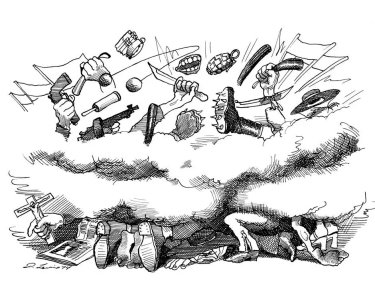
29 Oct 2022

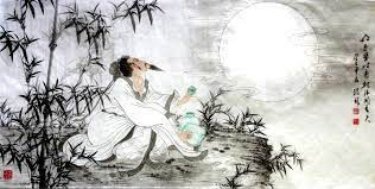
Dennis Zhou reviews Wong May’s In the Same Light: 200 Tang Poems.
In 755, the Sogdian-Turkish general An Lushan rebelled against Emperor Xuanzong of the Tang dynasty after a dispute with a cousin of the emperor’s favorite concubine. Within a year, the general had captured the eastern capital of Luoyang and declared himself emperor; the next year, his forces seized and sacked the capital of Chang’an (present-day Xi’an), then the most populous city in the world. Although An—blind, crazed, and so obese that he was said to crush horses to death under his own weight—was assassinated in 757 by a eunuch conspiring with his son, the rebellion continued for several years until finally being put down by the imperial army in 763. As many as 36 million people were killed or displaced during the insurrection—three-quarters of the population. The Tang dynasty never fully recovered, and after suffering another uprising in the ninth century, China descended into civil war, ending what many consider its Golden Age.
This era of war and famine coincided with an immense flowering of calligraphy, painting, and poetry. In the eighth century, Chang’an had become a bustling, cosmopolitan city with countless canals, parks, teahouses, and monasteries and a diverse population that included Uighurs, Turks, Japanese, and Koreans. With the imperial examination system, which recruited bureaucrats on the basis of their knowledge of classical literature and philosophy, poetry was elevated to a stature that it has rarely, if ever, reclaimed: a class of scholar-officials governed the empire, and no one could rise in the ranks without the ability to compose an elegant quatrain or a witty couplet.
The Tang Dynasty, which lasted more than 270 years, produced China’s greatest poets: the Daoist drifter Li Bai, the Confucian poet-historian Du Fu, the painter-poet Wang Wei, the Buddhist hermit Han Shan, and many others. Their lives were marked by unceasing political turmoil. Refugees and fugitives, they spent their years wandering from place to place, falling in and out of imperial favor and all the while drinking, singing, and writing. Their poetry—for the most part regulated verse comprising linked couplets of between five and seven characters—is what we think of when we think of Classical Chinese poetry.
The astounding influence that Chinese poetry in translation has had on the English language throughout the 20th century—from the Modernist, Imagist revolution of Ezra Pound’s Cathay (1915) through its mid-century, counter-cultural incarnation by Gary Snyder, Kenneth Rexroth, and others—can be traced to this ragtag assortment of drunkards, hermits, and exiles. Very few collections, however, situate the Tang poets fully within their political and historical context, drawing out both the urgency and stakes of their verse. Many anthologies… simply follow the model of Three Hundred Tang Poems (1763) compiled by the Qing scholar Sun Zhu, which for many decades remained the standard text. In the Same Light (The Song Cave, 2022), translated by the Chinese-Singaporean-Irish poet Wong May, does something different. Collecting 200 poems by 38 poets, Wong May promises to find parallels between their time and the present and, in so doing, update them “for our century.” To do this, she excavates her own story and its resonance with those of the Tang poets.
RTWT
14 Feb 2022

Ogden Nash (1902-1971)
To My Valentine
More than a catbird hates a cat,
Or a criminal hates a clue,
Or an odalisque hates the Sultan’s mates,
That’s how much I love you.
I love you more than a duck can swim,
And more than a grapefruit squirts,
I love you more than commercials are a bore,
And more than a toothache hurts.
As a shipwrecked sailor hates the sea,
Or a juggler hates a shove,
As a hostess detests unexpected guests,
That’s how much you I love.
I love you more than a wasp can sting,
And more than the subway jerks,
I love you truer than a toper loves a brewer,
And more than a hangnail irks.
I love you more than a bronco bucks,
Or a Yale man cheers the Blue.
Ask not what is this thing called love;
It’s what I’m in with you.
13 Feb 2022

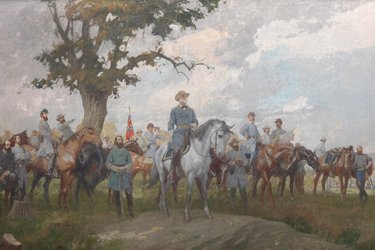
Charles C.J. Hoffbauer, Lee and His Generals, 1920.
This excerpt from Stephen Vincent Benet’s 1928 epic poem John Brown’s Body makes it clear why Americans, North and South, could set aside differences of politics and section, and look back together on Lee and other great Confederates as heroes.
Army of Northern Virginia, army of legend,
Who were your captains that you could trust them so surely?
Who were your battle-flags?
Call the shapes from the mist,
Call the dead men out of the mist and watch them ride.
Tall the first rider, tall with a laughing mouth,
His long black beard is combed like a beauty’s hair,
His slouch hat plumed with a curled black ostrich-feather,
He wears gold spurs and sits his horse with the seat
Of a horseman born.
It is Stuart of Laurel Hill,
“Beauty” Stuart, the genius of cavalry,
Reckless, merry, religious, theatrical,
Lover of gesture, lover of panache,
With all the actor’s grace and the quick, light charm
That makes the women adore him-a wild cavalier
Who worships as sober a God as Stonewall Jackson,
A Rupert who seldom drinks, very often prays,
Loves his children, singing, fighting spurs, and his wife.
Sweeney his banjo-player follows him.
And after them troop the young Virginia counties,
Horses and men, Botetort, Halifax,
Dinwiddie, Prince Edward, Cumberland, Nottoway,
Mecklenburg, Berkeley, Augusta, the Marylanders,
The horsemen never matched till Sheridan came.
Now the phantom guns creak by. They are Pelham’s guns.
That quiet boy with the veteran mouth is Pelham.
He is twenty-two. He is to fight sixty battles
And never lose a gun.
The cannon roll past,
The endless lines of the infantry begin.
A. P. Hill leads the van. He is small and spare,
His short, clipped beard is red as his battleshirt,
Jackson and Lee are to call him in their death-hours.
Dutch Longstreet follows, slow, pugnacious and stubborn,
Hard to beat and just as hard to convince,
Fine corps commander, good bulldog for holding on,
But dangerous when he tries to think for himself,
He thinks for himself too much at Gettysburg,
But before and after he grips with tenacious jaws.
There is D. H. Hill–there is Early and Fitzhugh Lee–
Yellow-haired Hood with his wounds and his empty sleeve,
Leading his Texans, a Viking shape of a man,
With the thrust and lack of craft of a berserk sword,
All lion, none of the fox. Read the rest of this entry »
09 Sep 2021


Why the Classics
by Zbigniew Herbert
1
in the fourth book of the Peloponnesian War
Thucydides tells among other things
the story of his unsuccessful expedition
among long speeches of chiefs
battles sieges plague
dense net of intrigues of diplomatic endeavours
the episode is like a pin
in a forest
the Greek colony Amphipolis
fell into the hands of Brasidos
because Thucydides was late with relief
for this he paid his native city
with lifelong exile
exiles of all times
know what price that is
2
generals of the most recent wars
if a similar affair happens to them
whine on their knees before posterity
praise their heroism and innocence
they accuse their subordinates
envious collegues
unfavourable winds
Thucydides says only
that he had seven ships
it was winter
and he sailed quickly
3
if art for its subject
will have a broken jar
a small broken soul
with a great self-pity
what will remain after us
will it be lovers’ weeping
in a small dirty hotel
when wall-paper dawns
Translated by Peter Dale Scott and Czeslaw Milosz.
05 Apr 2021

Let me die a youngman’s death
Let me die a youngman’s death
not a clean and inbetween
the sheets holywater death
not a famous-last-words
peaceful out of breath death
When I’m 73
and in constant good tumour
may I be mown down at dawn
by a bright red sports car
on my way home
from an allnight party
Or when I’m 91
with silver hair
and sitting in a barber’s chair
may rival gangsters
with hamfisted tommyguns burst in
and give me a short back and insides
Or when I’m 104
and banned from the Cavern
may my mistress
catching me in bed with her daughter
and fearing for her son
cut me up into little pieces
and throw away every piece but one
Let me die a youngman’s death
not a free from sin tiptoe in
candle wax and waning death
not a curtains drawn by angels borne
‘what a nice way to go’ death
— Roger McGough
HT: Vanderleun.
————–
Personally, I think John Buchan imagined “the best death” even better in his 1900 novel, “The Half-Hearted.”
14 Feb 2021

Ogden Nash (1902-1971)– To My Valentine
More than a catbird hates a cat,
Or a criminal hates a clue,
Or an odalisque hates the Sultan’s mates,
That’s how much I love you.
I love you more than a duck can swim,
And more than a grapefruit squirts,
I love you more than commercials are a bore,
And more than a toothache hurts.
As a shipwrecked sailor hates the sea,
Or a juggler hates a shove,
As a hostess detests unexpected guests,
That’s how much you I love.
I love you more than a wasp can sting,
And more than the subway jerks,
I love you truer than a toper loves a brewer,
And more than a hangnail irks.
I love you more than a bronco bucks,
Or a Yale man cheers the Blue.
Ask not what is this thing called love;
It’s what I’m in with you.
/div>

Feeds
|















